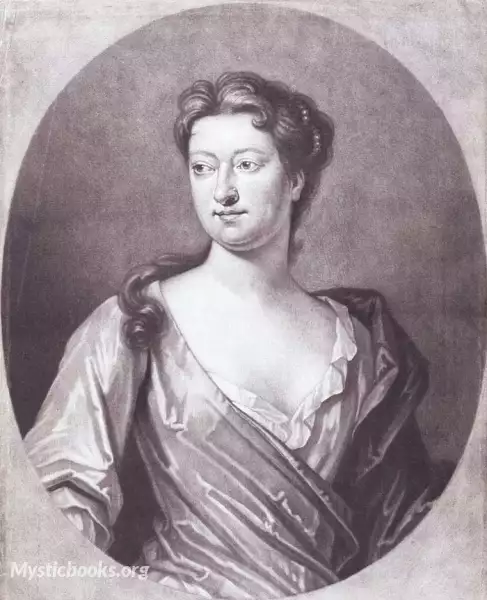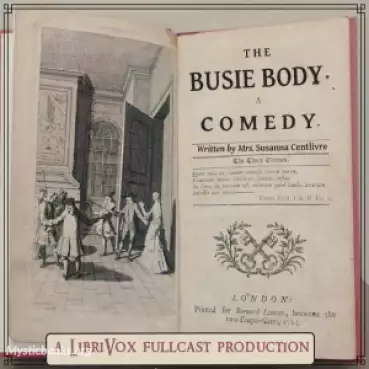
Timeline
Title
Country/Nationality
Susanna Centlivre
Susanna Centlivre born Susanna Freeman and also known professionally as Susanna Carroll, was an English poet, actress, and "the most successful female playwright of the eighteenth century". Centlivre's "pieces continued to be acted after the theatre managers had forgotten most of her contemporaries." During a long career at the Theatre Royal, Drury Lane, she became known as the second woman of the English stage, after Aphra Behn.
The main source of information on Centlivre's early life is Giles Jacob, who claimed he had received an account of it directly from her. This was published in The Poetical Register of 1719, yet it includes little information about her early life. Centlivre was probably baptised Susanna Freeman at Whaplode, Lincolnshire on 20 November 1669, as the daughter of William Freeman of Holbeach and his wife, Anne, the daughter of Mr Marham, a gentleman of Lynn Regis, Norfolk. Her father was a dissenter and a parliamentarian; as a result, the family certainly faced persecution at the Restoration. Several biographical sources state that Holbeach was the possible place of her birth or at least the place where she spent her childhood. There is some mystery surrounding her early life, but it is generally believed that her father died when she was three, her mother died shortly after remarrying, and her stepfather married soon after that. Abuse by this new stepmother may have motivated Centlivre to leave her childhood home before the age of 15.
There are two stories that tell of her transition to acting and eventual arrival in London. The romanticized version has Centlivre found weeping by the roadside by Anthony Hammond, a student at St John's College, Cambridge. Enraptured by her manners and good looks, he smuggled her into his college, where she was disguised as a male cousin, Jack. There she remained hidden for some months studying grammar and acquiring "some of the terms of logic, rhetoric, and ethics" before "attracting too much attention" and deciding to head to London. The more believable scenario has her joining a company of strolling actors in Stamford (about 25 miles from Holbeach), where she gained popularity acting in breeches roles, for which she was suited due to a "small Wen on her left Eye lid, which gave her a Masculine Air." Centlivre's skill in such roles charmed many men, especially Mr Fox, who would soon become Centlivre's first husband when she was sixteen. However, he died less than a year later. Following Fox's death, Centlivre is claimed to have married an army officer named Carroll, who died in a duel a year and a half after their union. She kept the name Carroll until her next marriage. Although much of her early years is speculation, biographers agree that Susanna's knowledge was predominantly self-acquired through reading and conversation. Looking at her use of French drama, it is not hard to see that Centlivre also had a sound knowledge of the French language. After her husband's death, Centlivre spent much of her time in London, where she turned to writing partly for financial support.
By 1706, Centlivre had made a small name for herself; however, she still relied on financial support from strolling (acting). It was during a performance when she played the role of Alexander the Great in Nathaniel Lee's tragedy The Rival Queens, or the Death of Alexander the Great for the court at Windsor Castle that she caught the eye of Joseph Centlivre. Though he was of a lower social class, a mere "yeoman of the mouth [cook] to Queen Anne," they were married on 23 April 1707. There is no evidence to suggest where they resided for the first seven years of their marriage. Eventually, in late 1712 or early 1713, the Centlivres moved into residence at Buckingham Court, paying the highest rent second only to the Admiralty Office. After a long, illustrious career in high literary esteem with writings in the form of poems, letters, books, and, most famously, plays, Susanna Centlivre died on 1 December 1723, from lingering effects of a serious illness contracted in 1719. The Evening Post, London Journal, British Journal, and Weekly Journal had brief notices of her death. Centlivre's body was buried three days after her death in St. Paul's, Covent Garden. A little over a year later, her husband followed.
Books by Susanna Centlivre

The Wonder! A Woman Keeps a Secret
Donna Isabella does not want to marry Don Guzman, her father's choice. Donna Violante's father wants her to become a nun. Isabella is attacked on the street and carried insensible into Violante's house. What will happen next? Confidential letters, se...

The Busie Body
The Busie Body is a Restoration comedy written by Susanna Centlivre and first performed at the Drury Lane Theatre in 1709. It focuses on the legalities of what constitutes a marriage, and how children might subvert parental power over whom they can m...

The Stolen Heiress
It is a comedy play by Susanna Centlivre, first performed in 1702. The play is set in Sicily and tells the story of a young woman named Lucasia who is tricked into marrying a man she does not love. Lucasia is eventually rescued by her true love, Pala...

The Beau's Duel, or A Soldier for the Ladies
It is an engaging and thrilling book that captures the imagination of young readers. This delightful story takes readers on a journey filled with humor, romance, and adventure. Originally written and performed in the 1700s, this classic tale has stoo...

Perjur'd Husband, or The Adventures of Venice
'Perjur'd Husband, or The Adventures of Venice' is a tragic play by Susanna Centlivre, exploring themes of love, betrayal, and the complexities of fate. The story revolves around Count Bassino, a Savoyard married to Placentia but deeply in love with...

Gamester
The play, 'Gamester', by Susanna Centlivre, centers on the reckless gambling habits of young Valere. His love for Angelica and his pursuit of wealth through the gaming tables lead him into financial ruin and the disapproval of his father, Sir Thomas....

Basset-Table
Sir Richard, a wealthy baronet, has arranged for his daughter Valeria to marry a Navy Captain. However, Valeria's heart belongs to young Ensign Lovely. When Lovely is captured by pirates, Valeria must decide whether to follow her heart or her father'...